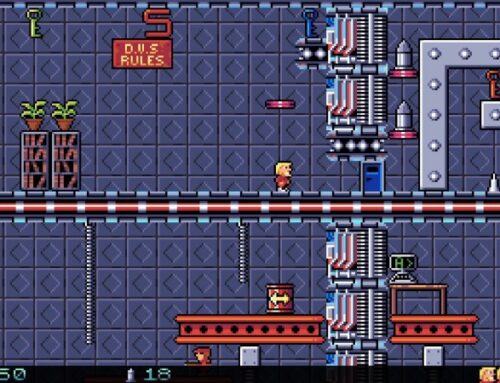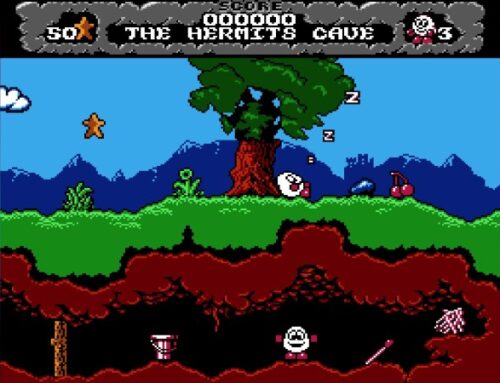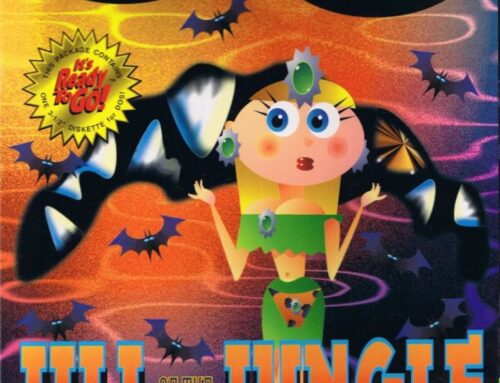The discovery of the Kliktopia project, which archives a variety of games produced with all the different generations of Clickteam’s “Click” series, has brought me great delight.
If you grew up in the mid to late ’90s and were making use of Windows PCs at the time, chances are you came across Clickteam’s products at one point or another. Building on the great work that authors François Lionet and Yves Lamoureux did with the Atari ST and Amiga-based BASIC-style programming languages STOS and AMOS, what became known colloquially as the “Klik” or “Click” series brought amateur game development within the reach of anyone with a mouse and an imagination.

Launching in 1994, Klik & Play offered completely “drag and drop” game creation, eschewing the need for coding from STOS and AMOS. Instead, Klik & Play offered an events-based method of programming: you set up a series of triggers to test for, then simply told your game what to do when one of those triggers were true. For example, you could tell your player sprite to shoot when the player pressed the fire button, or a timer to tick down every full second, or check for more complex situations using combinations of triggers.
Klik & Play had its limitations — most notably an inability to create scrolling levels — though as ever, the online community found plenty of ways to brute force one’s way past many of these restrictions, and it was possible to create some surprisingly elaborate games without writing a single line of code.
As the years passed, Klik & Play was improved with a series of subsequent releases. Its immediate follow-up Click & Create was designed to be a more comprehensive package that could be used to create both games and interactive applications, while its cheaper-priced counterpart The Games Factory focused specifically on the games-related features. As time went on, the series became known as “Fusion”, and started to incorporate the ability to load in external extensions, allowing for potentially limitless possibilities on top of the already substantial feature set included in the package.
Today, Clickteam Fusion, as the product is now known, is still going strong, with its 2.5 and 2.5+ releases proving popular among indie developers in particular. Notable games that have been created with more recent versions of Clickteam Fusion include The Escapists, Freedom Planet, Not a Hero and the original Five Nights at Freddy’s — so if you know what you’re doing there’s definitely the potential to put out commercial-quality products using the software. Who knows? You could be one of the next Indie Heroes!

Part of the joy of the Klik series was always seeing what amateur hobbyist developers were getting up to, though — and it’s these homebrew efforts that Kliktopia seeks to celebrate and archive, since many of the personal sites that these freeware games were originally hosted on are long gone from today’s Internet.
Archivist Josh “Joshtek” Dowen started working on Kliktopia in 2018 after being inspired by a local history project that explored oral histories and in-depth explorations of historical documents. He found himself wanting to do something similar for the Klik community, which had been an important part of his life in the late ’90s and early ’00s prior to attending university. After all, while there have been high-profile preservation efforts for many big-name games out there, very few people are out there archiving hobbyist projects that once meant a lot to the people who made them.
“The approach I took is to capture these Klik games in bulk, without trying too hard to filter for quality,” he explains in a recent blog post explaining the state of the Kliktopia archive. “Every game is someone’s creation and is something that someone else might think of fondly, and one of the best ways to ensure that we have the game that any particular person wants is to collect them in bulk, with as much automation in the process as possible.
“I decided that screenshots were invaluable in helping people determine if the game was the one they were looking for,” he continues, “and it was also an easy way for people to gauge a sense of the genre and quality of the game.”
Kliktopia launched in March of 2020 with about 1,000 games that Joshtek had archived and curated himself from previous sites such as the Klik Archive, which was active between 1995 and 1998, as well as collections from various community members. He also drew on his own personal collections of Klik-related downloads, which he had continued to transfer from computer to computer over the course of the passing years, and added an uploader tool to the site that would help people search their own computers for Klik games and submit them to the site.

As the project developed, additional people became involved and it became more ambitious. Games that were once playable on the Web through Clickteam’s “Vitalize!” plugin are now playable again, including online “V-Cade” leaderboards. And once-popular online Klik games — created using the various versions of Fusion and a series of extensions known as “Multiplayer Online Object” or “MOO” — are once again available to play. So if you’ve had a hankering to revisit SmileyHouse, Tank Wars Online and Flanville — the latter of which is an early game from Five Nights at Freddy’s original designer Scott Cawthon — you can now do so!
As of January 2022, Joshtek believes that Kliktopia has archived “the majority of the freeware Klik games that people involved in the communities [he] was involved in would remember” but notes that there are likely plenty more hobbyist projects out there which maybe never made it to the Internet. I know I’ve certainly got copies of the games my school friends and I made — Pie-Eater’s Destiny, London Taxi Chase and Hobbit Blasters — knocking around somewhere, so I’ll have to get those added to the archive as soon as possible.
If you want to explore the archive — or perhaps contribute some of your own creations from days gone by — stop by the official Kliktopia website to find out more. Note that since earlier versions of Klik products were 16-bit Windows applications, you may struggle to run very early games — check this article to find out more about how you can get them up and running in various ways.
Now, if you’ll excuse me, all this nostalgia has got me in the mood for some amateur development… and I still have some Christmas money left over… well, there’s only one thing to do, then, isn’t there?




